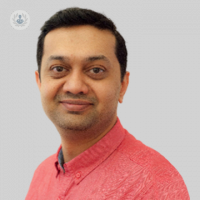Fertility and the menopause: Part 2
Written in association with:Fertility and the menopause represent significant and intricate aspects of a woman's reproductive journey, each marking distinct phases in her life.
Mr Laxmikant Chaudhari is a renowned consultant gynaecologist who specialises in fertility investigations and the menopause.
In the final part of two articles on fertility and the menopause, Mr Chaudhari offers an expert insight into the lifestyle changes that can support fertility and the medical options available for both fertility and the menopause.

Are there natural remedies or lifestyle changes that can support fertility and overall reproductive health?
There are several natural remedies and lifestyle changes that can help support fertility. However, individual responses can vary, and thus consulting with a healthcare professional is advisable before making significant changes.
Here are general suggestions:
- Maintaining a healthy diet: Eating a well-balanced diet rich in fruits, vegetables, whole grains, and lean proteins. Integrating antioxidant-rich foods like berries, nuts, and leafy greens to combat oxidative stress.
- Managing weight: Maintaining a healthy weight, aiming for a BMI between 18 and 30 to optimise fertility outcomes. Engaging in regular exercise, but avoiding excessive and intense workouts that may negatively impact fertility.
- Staying hydrated: Drinking plenty of water to support overall health and hydration.
- Limiting alcohol and caffeine intake: Practising moderate alcohol consumption and avoiding excessive caffeine intake.
- Quitting smoking: Quitting smoking positively impacts fertility in both men and women.
- Managing stress: Practising stress-reduction techniques like meditation, yoga, or deep breathing exercises.
Additionally:
- Ensuring adequate sleep: Prioritising quality sleep, as it plays a crucial role in overall health, including reproductive health.
- Avoiding environmental toxins: Minimising exposure to environmental toxins like pesticides and chemicals which may affect fertility.
- Balancing hormones: Considering certain herbs and supplements, such as myo-inositol, coenzyme Q10, and omega-3 fatty acids, which can have positive effects on fertility.
- Tracking menstrual cycles: Women can monitor their menstrual cycles to identify the most fertile days for conception.
- Male reproductive health: Men should also embrace a healthy lifestyle, as factors like a healthy diet, regular exercise, and avoiding excessive heat (e.g hot baths or tight underwear) can positively affect sperm quality.
- Going for a preconception check-up: Both partners should have a preconception check-up to address any underlying health issues.
Fertility issues can be complex, and if a couple is having difficulty conceiving, seeking guidance from a healthcare professional who can provide personalised advice is recommended.
What medical options are available for women who are experiencing challenges with fertility or the menopause?
Fertility and the menopause are complex issues that may require medical intervention to address specific concerns. Individual cases can vary, and thus discussing treatment options with a healthcare professional is essential.
For fertility challenges, medical options may include:
- Fertility medications: Hormonal medications like Clomiphene, Letrozole, and Gonadotropins may be prescribed to stimulate ovulation.
- Intrauterine insemination (IUI): IUI involves placing sperm directly into the uterus during ovulation to increase the chances of fertilisation.
- In vitro fertilisation (IVF): IVF involves fertilising an egg with sperm outside the body before implanting the embryo into the uterus.
- Surgery: In some cases, surgery may be performed to address structural issues affecting fertility, such as the removal of fibroids or the treatment of endometriosis.
For the menopause, medical options may include:
- Hormone replacement therapy (HRT): HRT involves the use of oestrogen and sometimes progestin to alleviate menopausal symptoms like hot flashes, mood swings, and vaginal dryness. Its use, however, should be carefully considered by a healthcare professional.
- Non-hormonal medications: Selective serotonin reuptake inhibitors (SSRIs) or gabapentin can help manage specific symptoms of the menopause.
- Lifestyle changes: Embracing a healthy lifestyle with regular exercise, a balanced diet, and effective stress management techniques can help manage symptoms and enhance overall wellbeing during the menopause.
- Vaginal oestrogen therapy: Localised oestrogen therapy in the form of creams, rings, or tablets may be prescribed for vaginal dryness.
Seeking guidance from a healthcare professional is essential for women navigating fertility challenges or the menopause. Personalised advice, based on individual health history, preferences, and specific circumstances, can be provided.
To schedule an appointment with Mr Laxmikant Chaudhari, head on over to his Top Doctors profile today.


